Related Research Articles
The Eurovision Song Contest, often known simply as Eurovision, is an international song competition organised annually by the European Broadcasting Union. Each participating country submits an original song to be performed live and transmitted to national broadcasters via the Eurovision and Euroradio networks, with competing countries then casting votes for the other countries' songs to determine a winner.

The Eurovision Song Contest 1956 was the first edition of the annual Eurovision Song Contest, organised by the European Broadcasting Union (EBU) and host broadcaster Radio svizzera italiana (RSI) on behalf of the Swiss Broadcasting Corporation. The contest, originally titled the Gran premio Eurovisione 1956 della canzone europea, was held on 24 May 1956 at the Teatro Kursaal in Lugano, Switzerland, and hosted by Swiss television presenter Lohengrin Filipello, which remains the only time that the contest has been hosted by a solo male presenter.
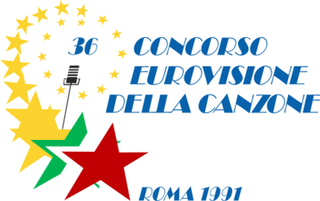
The Eurovision Song Contest 1991 was the 36th edition of the Eurovision Song Contest, held on 4 May 1991 at Stage 15 of the Cinecittà Studios in Rome, Italy. Organised by the European Broadcasting Union (EBU) and host broadcaster Radiotelevisione italiana (RAI), and presented by Gigliola Cinquetti and Toto Cutugno, the contest was held in Italy following the country's victory at the 1990 contest with the song "Insieme: 1992" by Toto Cutugno.

The Eurovision Song Contest 1990 was the 35th edition of the Eurovision Song Contest, held on 5 May 1990 in the Vatroslav Lisinski Concert Hall in Zagreb, Yugoslavia. Organised by the European Broadcasting Union (EBU) and host broadcaster Radiotelevizija Zagreb on behalf of Jugoslavenska radiotelevizija (JRT), and presented by Oliver Mlakar and Helga Vlahović, the contest was held in Yugoslavia following the country's victory at the 1989 contest with the song "Rock Me" by the group Riva. It was the first contest to be held in the Balkans and the only to be held in a socialist state.
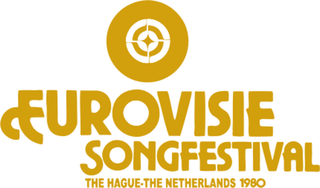
The Eurovision Song Contest 1980 was the 25th edition of the annual Eurovision Song Contest. It took place in The Hague, Netherlands, and was organised by host broadcaster Nederlandse Omroep Stichting (NOS) – which agreed to stage the event after Israel, having won in both 1978 and 1979, declined to host it for a second successive year – and the European Broadcasting Union (EBU). The contest was held at the Nederlands Congresgebouw on 19 April 1980 and was hosted by Dutch actress Marlous Fluitsma, although each song was introduced by a presenter from the participating nation.

The Eurovision Song Contest 1979 was the 24th edition of the annual Eurovision Song Contest. It took place in Jerusalem, Israel, following the country's victory at the 1978 contest with the song "A-Ba-Ni-Bi" by Izhar Cohen and the Alphabeta. Organised by the European Broadcasting Union (EBU) and host broadcaster the Israel Broadcasting Authority (IBA), the contest was held at the Menachem Ussishkin auditorium of the International Convention Centre on 31 March 1979, and was hosted by Israeli television presenter Daniel Pe'er and singer Yardena Arazi. This was the first time that the Eurovision Song Contest was held outside Europe.

The Eurovision Song Contest 1982 was the 27th edition of the annual Eurovision Song Contest. It took place in Harrogate, United Kingdom, following the country's victory at the 1981 contest with the song "Making Your Mind Up" by Bucks Fizz. Organised by the European Broadcasting Union (EBU) and host broadcaster British Broadcasting Corporation (BBC), the contest was held at the Harrogate International Centre on 24 April 1982 and was hosted by English TV presenter and newsreader Jan Leeming.

The Eurovision Song Contest 1984 was the 29th edition of the Eurovision Song Contest, held on 5 May 1984 in the Théâtre Municipal in Luxembourg City, Luxembourg. Organised by the European Broadcasting Union (EBU) and host broadcaster Radio Télévision Luxembourg (RTL), the contest was held in Luxembourg following the country's victory at the 1983 contest with the song "Si la vie est cadeau" by Corinne Hermès. The event was presented by Désirée Nosbusch, who, at 19 years old, remains the youngest person to have hosted the contest as of 2024.

The Eurovision Song Contest 1972 was the 17th edition of the annual Eurovision Song Contest. It took place in Edinburgh, Scotland, United Kingdom and was organised by the European Broadcasting Union (EBU) and host broadcaster British Broadcasting Corporation (BBC), who agreed to stage the event after the Monégasque broadcaster Télé Monte Carlo (TMC), who won in 1971, was unable to meet the demands of hosting the event and could not find a suitable venue. The contest was held at the Usher Hall on 25 March 1972 and was hosted by Scottish ballet dancer Moira Shearer. Eighteen countries took part in the contest, the same number as the previous year.

The Eurovision Song Contest 1974 was the 19th edition of the Eurovision Song Contest, held on 6 April 1974 in the Dome in Brighton, United Kingdom. Organised by the European Broadcasting Union (EBU) and host broadcaster the British Broadcasting Corporation (BBC), and presented by Katie Boyle, this was the fifth time that the United Kingdom had staged the contest.

The Eurovision Song Contest 1978 was the 23rd edition of the annual Eurovision Song Contest. It took place in Paris, France, following the country's victory at the 1977 contest with the song "L'Oiseau et l'Enfant" by Marie Myriam. Organised by the European Broadcasting Union (EBU) and host broadcaster Télévision Française 1 (TF1), the contest was held at the Grand Amphitheatre inside the Palais des Congrès on 22 April 1978 and was directed by Bernard Lion. The contest was presented by French television presenters Denise Fabre and Léon Zitrone. This was the first time that more than one presenter had hosted the contest as well as the first to have a male presenter since 1956.
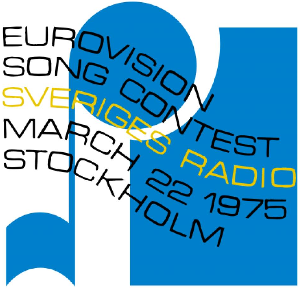
The Eurovision Song Contest 1975 was the 20th edition of the Eurovision Song Contest, held on 22 March 1975 in the Sankt Eriks-Mässan in Stockholm, Sweden and presented by Karin Falck. Organised by the European Broadcasting Union (EBU) and host broadcaster Sveriges Radio (SR), the contest was held in Sweden following the country's victory at the 1974 contest with the song "Waterloo" by ABBA. Nineteen countries were represented at the contest – a new record number of participants. Turkey made its first entry in the contest, and France and Malta returned after a one- and two-year absence, respectively. Greece, after participating for the first time in the previous year's event, opted not to participate in 1975.
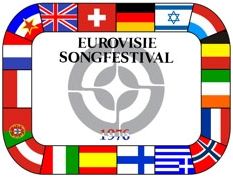
The Eurovision Song Contest 1976 was the 21st edition of the annual Eurovision Song Contest. It took place in The Hague, Netherlands, following the country's victory at the 1975 contest with the song "Ding-a-dong" by Teach-In. Organised by the European Broadcasting Union (EBU) and host broadcaster Nederlandse Omroep Stichting (NOS), the contest was held at the Nederlands Congrescentrum on 3 April 1976 and was hosted by 1957 Dutch Eurovision winner Corry Brokken.

The Eurovision Song Contest 1996 was the 41st edition of the Eurovision Song Contest, held on 18 May 1996 at the Oslo Spektrum in Oslo, Norway. Organised by the European Broadcasting Union (EBU) and host broadcaster Norsk rikskringkasting (NRK) and presented by Ingvild Bryn and Morten Harket, the contest was held in Norway following the country's victory at the 1995 contest with the song "Nocturne" by Secret Garden.
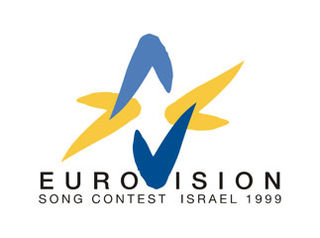
The Eurovision Song Contest 1999 was the 44th edition of the Eurovision Song Contest, held on 29 May 1999 at the International Convention Centre in Jerusalem, Israel. Organised by the European Broadcasting Union (EBU) and host broadcaster Israel Broadcasting Authority (IBA), the contest was held in the country following its victory at the 1998 contest with the song "Diva" by Dana International, and was presented by Dafna Dekel, Yigal Ravid and Sigal Shachmon.

The Turkish Radio and Television Corporation is the national public broadcaster of Turkey, founded in 1964. TRT was for many years the only television and radio broadcaster in Turkey. Before the introduction of commercial radio in 1990, and subsequently commercial television in 1992, it held a monopoly on broadcasting. More recent deregulation of the Turkish television broadcasting market produced analogue cable television. Today, TRT broadcasts around the world, including in Europe, the Middle East, Africa, Asia, the United States, and Australia.

Luxembourg has participated in the Eurovision Song Contest 38 times since its debut at the first contest in 1956. The Luxembourgish national broadcaster, RTL Lëtzebuerg (RTL), participates in the contest representing the country. The nation participated in all but one event between 1956 and 1993, only missing the 1959 contest. After finishing among the bottom seven countries in 1993, Luxembourg was relegated and prevented from competing in 1994. The nation declined to return to the contest in 1995, and would make no further appearances over the next three decades. The country returned to the event for the first time in 31 years in 2024.

Turkey has participated in the Eurovision Song Contest 34 times since its debut in 1975. The Turkish participant broadcaster in the contest is Türkiye Radyo ve Televizyon Kurumu (TRT). Turkey won the contest once in 2003, and hosted the 2004 contest in Istanbul. Since the introduction of the semi-finals in 2004, Turkey has only failed to qualify for the final once, in 2011.
Roj TV was an international Kurdish satellite television station broadcasting programmes in the Kurmanji, Sorani and Hewrami dialects of the Kurdish language as well as in Persian, Zaza, Arabic, and Turkish.

The Eurovision Song Contest was first held in 1956, originally conceived as an experiment in transnational television broadcasting. Following a series of exchange broadcasts in 1954, the European Broadcasting Union (EBU) commissioned an international song competition, from an idea developed by Sergio Pugliese and Marcel Bezençon and originally based on the Italian Sanremo Music Festival.
References
- ↑ Eroğlu, Muzaffer; Finger, Matthias (2022-01-01). The Regulation of Turkish Network Industries. Springer Nature. ISBN 978-3-030-81720-6.
- ↑ Heper, Metin; Sayari, Sabri (2013-05-07). The Routledge Handbook of Modern Turkey. Routledge. ISBN 978-1-136-30964-9.
- ↑ Retis, Jessica; Tsagarousianou, Roza (2019-03-14). The Handbook of Diasporas, Media, and Culture. John Wiley & Sons. ISBN 978-1-119-23675-7.
- ↑ Aktürk, Şener (2012-11-19). Regimes of Ethnicity and Nationhood in Germany, Russia, and Turkey. Cambridge University Press. ISBN 978-1-107-02143-3.